Igor Sechin Delivers Keynote Address at Opening of 4th Russian-Chinese Energy Business Forum
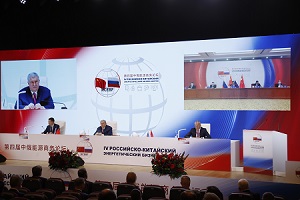
Igor Sechin, Executive Secretary of the Commission for the President of the Russian Federation on the strategy of development of the fuel and energy industry and environmental safety, Chief Executive Officer of Rosneft Oil Company, delivered a keynote address at the opening of the 4th Russian-Chinese Energy Business Forum devoted to deepening energy cooperation between the two countries.
The Russian-Chinese Energy Business Forum has been held on a regular basis since 2018, in line with the agreements reached by President Vladimir Putin of the Russian Federation and President Xi Jinping of the People’s Republic of China.
The Forum takes place under the auspices of the Commission for the President of the Russian Federation on the strategy of development of the fuel and energy industry and environmental safety and the State Energy Administration of the People’s Republic of China, and is co-organised by Rosneft and China National Petroleum Corporation.
The plenary session of the Forum was attended by Alexander Novak, Deputy Prime Minister of Russia; Han Zheng, Vice Premier of the State Council of China; Dai Houliang, Chairman of the CNPC Board of Directors; CEOs of Russian and Chinese companies; representatives of the scientific community.
Opening the plenary session, Igor Sechin read out a welcoming message from Russian President Vladimir Putin to the guests and participants of the 4th Russian-Chinese Energy Business Forum.
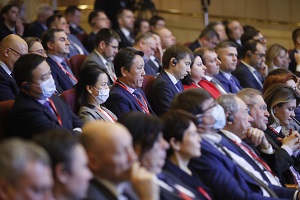 In particular, Vladimir Putin noted in his address that, despite the complexity of the international situation, relations between the Russian Federation and the People’s Republic of China continue to develop in an upward direction. The energy sector remains one of the key and most dynamic areas of economic cooperation between the two countries.
In particular, Vladimir Putin noted in his address that, despite the complexity of the international situation, relations between the Russian Federation and the People’s Republic of China continue to develop in an upward direction. The energy sector remains one of the key and most dynamic areas of economic cooperation between the two countries.
“The Russian-Chinese Energy Business Forum plays an increasingly prominent role in expanding cooperation in such an important sector, facilitating regular dialogue between representatives of government agencies, leading industry corporations, banking institutions and expert circles of the two countries. One of the Forum’s most vital activities is the creation of the “Atlas of Russian-Chinese Energy Cooperation Investments”. There is no doubt that the development of this unique information and analysis platform opens up new opportunities for mutually beneficial commercial initiatives,” reads the address of the Russian President.
BEIJING FAVOURS CLOSE ENERGY PARTNERSHIP WITH MOSCOW
China’s President Xi Jinping also sent a message of greetings to Forum participants, declaring energy to be the cornerstone of cooperation between China and Russia.
According to the PRC President, Beijing intends to build a closer partnership with Moscow in the energy sector. “The energy engagement between China and Russia is a cornerstone of practical cooperation between the two countries and also serves as an effective force for global energy security,” reads Xi Jinping’s address delivered by Han Zheng, Vice Premier of the State Council of China.
Russia and China’s energy cooperation demonstrates sustainability despite external challenges, the PRC President said.
“In the face of external risks and challenges, Russia and China are intensifying interaction and coordination, promoting major cooperation projects, demonstrating the high sustainability of Russian-Chinese energy cooperation,” reads Xi Jinping’s address.
PRC WORKING TO UNITE HUMANITY AND THE WEST TO DIVIDE IT
In his speech, the head of Rosneft noted that Forum was taking place right after the historic 20th Congress of the Communist Party of China, which had provided a profound assessment of the global transformation happening at the moment.
Igor Sechin quoted China’s President Xi Jinping as saying: “China has entered a period of development, in which strategic opportunities, risks, and challenges are concurrent and uncertainties and unforeseen factors are rising—the so-called “black swans” or “grey rhinos”.
Non-competitive pressure, sanctions, a radical breakdown of the existing world order, unprecedented volatility—all this leads, according to China’s President, to “a shortage of development, a shortage of governance and a shortage of security”.
“It should be noted that our leaders’ principal assessments of the processes taking place in the world today coincide,” Rosneft CEO stressed.
Igor Sechin noted that Xi Jingping’s 2015 proposal at the rostrum of the UN to create a “community of one destiny for the humankind”, which underlay Chinese foreign policy (as part of the preamble to China’s Constitution), was a worthy response to the challenges of the growing turbulence. “The Western opponents cannot or do not want to understand the great humanitarian meaning of this idea, rejecting the concept of common destiny because of certain ideological considerations,” Igor Sechin believes. “They do not want to understand that it is not about a uniformity, which is naturally alien to the Chinese cultural tradition.” “All phenomena develop together and do not impede one another, all principles are effected together and do not contradict one another,” says a Chinese wisdom. “China simply tells the world: “We are all in the same boat.” And it turns out that China is working to unite humanity, while the West is working to divide it,” Igor Sechin said.
RUSSIA AND CHINA’S UNIQUE OPPORTUNITIES FOR COOPERATION
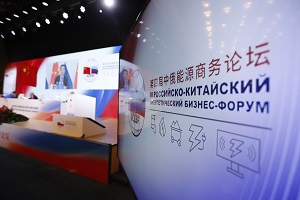 Rosneft CEO said that China, like Russia, had always been against unilateral sanctions and economic pressure, which turned into selfish promotion of one’s own selfish interests, and had always advocated the universal and equal application of international law. “Nevertheless, we see that the PRC is subjected to commercial discrimination. The goal is openly set to stop China’s technological development and prevent China from becoming the Number 1 technological power,” the head of Rosneft believes. No wonder the 20th CPC Congress has paid so much attention to security, which is becoming a political priority.
Rosneft CEO said that China, like Russia, had always been against unilateral sanctions and economic pressure, which turned into selfish promotion of one’s own selfish interests, and had always advocated the universal and equal application of international law. “Nevertheless, we see that the PRC is subjected to commercial discrimination. The goal is openly set to stop China’s technological development and prevent China from becoming the Number 1 technological power,” the head of Rosneft believes. No wonder the 20th CPC Congress has paid so much attention to security, which is becoming a political priority.
Speaking about the economy, the first thing here is resource security, that is, availability of reserves, reliable resource supply sources, control and security throughout supply logistics. And secondly, it is the restoration of forcibly destroyed production and technology chains.
“An attempt to squeeze China out of key areas of global cooperation could be very costly for the entire global economy, boomeranging on the initiators of such processes,” Igor Sechin noted.
Rosneft CEO emphasised the unique opportunities that the cooperation offers in terms of ensuring China’s and Russia’s economic security in sensitive areas. “In the field of resource supply, including energy resources, Russia is a reliable supplier with a huge potential that is capable of expanding. As for production and technological logistics, our partnership here seems to be the most protected in terms of security,” Igor Sechin said.
POLE OF STABILITY AND GROWTH
Rosneft CEO believes that, amid the global energy crisis, trade and economic relations between Russia and China have become a pole of stability and growth. Following the 2021 results, China ranked first in the list of Russia’s trade partners, he said.
Over 10 months of this year, trade turnover between Russia and China reached $153.9 billion, having increased by 33% year-on-year. “If the pace is maintained, by the end of this year the trade turnover may reach a record high of $180-190 billion. One can expect that the target to reach $200 billion in trade turnover will be delivered even earlier than the deadline of 2024,” Igor Sechin said.
SETTLEMENTS IN NATIONAL CURRENCIES
Rosneft CEO noted that the development of trade and an increase in trade turnover had led to a significant increase in the volume of settlements in national currencies, the need for which was repeatedly talked about at previous forums. For instance, the average daily trading volume on the Moscow Exchange rose from 2 billion roubles at the beginning of the year to 90 billion roubles in October this year (a 45-fold increase), exceeding the average daily trading volume in the rouble/US dollar pair.
Igor Sechin reminded the audience that, in 2022, Rosneft placed an issue of bonds in yuan to a total of 15 billions. “According to banking analysts, this is the largest market placement of corporate bonds on the Russian market in its history,” the head of Rosneft said.
Igor Sechin noted that settlements under foreign economic contracts, primarily for the supply of energy products, had been promptly adapted to the new conditions. “I consider it important to develop clearing payments between China and Russia, which could then be joined by other interested countries (EAEU, SCO, BRICS). The existence of an independent settlement system is an important component of financial sovereignty in the contemporary world,” the head of Rosneft said.
INTEGRAL COOPERATION
Igor Sechin believes that, at the new stage of economic development, China searches and finds new ideas and directions of investment growth and, in his opinion, Russia with its colossal resource potential could become one of such ideas. He reminded the audience that President Xi Jingping had noted in his speech at the 20th Congress, “To forge iron, one must be strong.”
“Our investment partnership could provide such a strength,” Rosneft CEO reckons.
Igor Sechin emphasised that the strategic decision to turn East, and especially the unprecedented level of Russia’s current relations with China, was the result of Russia’s internal development and understanding of the current processes in the world, rather than a consequence of pressure from the West.
“An important role in the strategic turn to the East has traditionally belonged to Rosneft. The Company has always promoted integral cooperation with Chinese partners along the entire technological chain: that is exploration and production, refining, power generation, sales at potential markets, including retail sales,” Igor Sechin said. As a rule, such cooperation implies exchange of shares, setup of joint ventures, supply of equipment, and technological partnership.
At this stage, Russian energy companies are ready to make proposals to Chinese partners in all key areas of such a vertical partnership (coal, gas, oil, electricity, nuclear, etc.).
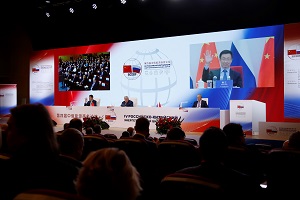 Rosneft remains a key Russian oil supplier to China, accounting for 7% of the Chinese market’s total demand for crude oil, the head of the Company recounted.
Rosneft remains a key Russian oil supplier to China, accounting for 7% of the Chinese market’s total demand for crude oil, the head of the Company recounted.
Total volume of Russian oil exports to China in January-October 2022 increased by 9.5% year-on-year to reach almost 72 million tonnes (second place after Saudi Arabia (73.8 million tonnes).
DEVELOPING ENERGY COOPERATION
Igor Sechin specified that the gas sector was one of the most promising areas for building up Russia-China cooperation.
“In perspective, the Chinese gas market will be showing the highest growth rate in the world. The Chinese gas consumption is expected to almost double by 2040 and so it will exceed 660 billion cubic metres per year (380 billion cubic metres per year at present),” Rosneft CEO believes.
He noted that the volume of pipeline gas supplies from Russia to China in the foreseeable future already would exceed 100 billion cubic metres per annum. “At the same time, the Russian natural gas resource base potential significantly exceeds these volumes. This concerns both the gas reserves in Western Siberia that are being diverted from the European route, and also the vast resource base in Eastern Russia,” Sechin said.
“Rosneft alone has gas reserves in Eastern Siberia and the Far East, which can potentially be delivered to China through pipelines in the excess of 2 trillion cubic metres,” the head of the Company stressed.
According to Igor Sechin, no less promising was the growing supply of Russian liquefied natural gas to China. Today Russia exports to China relatively small volumes of LNG, but in the future, the volume of LNG supplies may become comparable to our supplies from pipeline projects.
Russia is expanding coal export opportunities to the east and investing heavily in the Eastern railroad domain, that is the Baikal-Amur Mainline and the Trans-Siberian Railway. “Today this is definitely a top priority railway construction project in our country, and so it is subject to the close attention of the President of the Russian Federation. We expect that the development of the Eastern railroad domain already in the next few years will augment the transportation capacity to 195 million tons per year and will help significantly increase the export of coal to the Asia Pacific region,” Executive Secretary of the Commission for the President of the Russian Federation on the strategy of development of the fuel and energy industry and environmental safety Igor Sechin said.
He reminded the audience that, in 2022, amid the abnormal heat and power shortages, at the request of the Chinese side Inter RAO had increased its supplies of power energy from Russia to China. In January-October, supplies went up by 33% compared to the same period last year.
“Our countries continue successful cooperation in the nuclear sector. The first and second stages of the Tianwan nuclear power plant that consist of Power Units from No. 1 to No. 4 are already in use— these are state-of-the-art VVER-1000 units, the most reliable in the world; and the contracts for the projects of the Tianwan nuclear power plant Units No. 7 and No. 8 and Xudapu nuclear power plant Units No. 3 and No. 4 of are underway,” Executive Secretary of the Presidential Commission on the strategy of development of the fuel and energy industry Igor Sechin said.
VOSTOK OIL TO SECURE ENERGY SUPPLIES TO ASIA
Rosneft CEO reminded the audience that the main problem of the energy industry was the global underinvestment in conventional energy sources, largely due to the politicised and inadequate implementation of accelerated “green transition” creating risks of a global energy deficit.
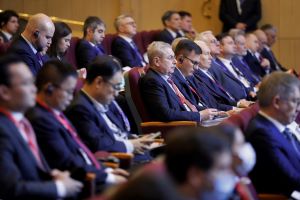 “All that said, I would like to emphasise that Russian companies are not cutting back on investments in new projects and technologies,” Igor Sechin said. Rosneft CEO noted that the largest investment project in the world and the biggest project in Russia was the Vostok Oil project in the northern part of Krasnoyarsk Territory.
“All that said, I would like to emphasise that Russian companies are not cutting back on investments in new projects and technologies,” Igor Sechin said. Rosneft CEO noted that the largest investment project in the world and the biggest project in Russia was the Vostok Oil project in the northern part of Krasnoyarsk Territory.
“We expect that, by 2033, the production level from this project will reach 115 million tonnes of oil. It is close to 2.5% of the current global oil production. The project envisages direct transport of light and low-sulphur oil by Northern Sea Route. In this year alone, the resource base of the project rose by 300 million tonnes to reach the number of 6.5 billion tonnes,” Sechin said.
China’s stated concept of “dual control” over total emissions and their intensity is also relevant to Russia. Vostok Oil is the only new project in the world that provides not only reliable but also environmentally responsible oil supplies, as the design solutions include the application of advanced environmental protection technologies from the well drilling stage to the specialised design of oil pipelines and tankers for oil export.
“Vostok Oil project will provide long-term, reliable, and guaranteed energy supplies to Asia’s growing economies and reduce price volatility by preventing price spikes that destroy market stability and cause damage to all the market participants,” Igor Sechin said.
WORLD-CLASS INFRASTRUCTURE PROJECT
Northern Sea Route development and its transformation into one of the world’s main transportation arteries is the largest global infrastructure project with Chinese participation, Igor Sechin said. Executive Secretary of the Presidential Commission on the strategy of development of the fuel and energy industry noted that the trend of cargo traffic increase along the NSR has been observed for several years: In 2021, the traffic reached a record, exceeding 33.5 million tonnes, and by 2024, it is expected to reach 80 million tonnes.
“Cooperation between Russia and China in the Arctic is developing dynamically. We welcome Chinese partners in the Russian Arctic projects, including the joint development of the Northern Sea Route and the associated coastal infrastructure,” Igor Sechin said.
He reminded the audience that, on November 22, 2022, nuclear icebreaker Yakutia had been launched and the national flag had been raised on the nuclear icebreaker Ural with the participation of Russian President Vladimir Putin. “Nuclear icebreaker fleet renovation is the key condition for the Northern Sea Route further development,” Igor Sechin believes.
He also noted that, on November 16, 2022, the first ever railway bridge over the Amur River between the Russian Federation and the People’s Republic of China had been commissioned. Maximum bridge traffic capacity would be up to 20 million tonnes of cargo per year; the cargo transportation distance to the northern provinces of China would be reduced by more than 700 km compared to the existing routes, Executive Secretary of the Presidential Commission on the strategy of development of the fuel and energy industry said.
Igor Sechin concluded his address by stating that the world was changing radically, and Russia and China inevitably strived for a mutually beneficial partnership, which created new opportunities to build the community of a shared future for humankind as had been rightly noted by China’s President Xi Jinping.
Presentation to Igor Sechin’s address at the 4th Russian-Chinese Energy Business Forum
Rosneft
Information Division
November 29, 2022